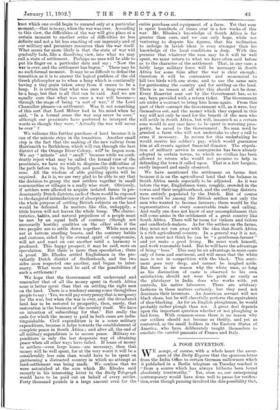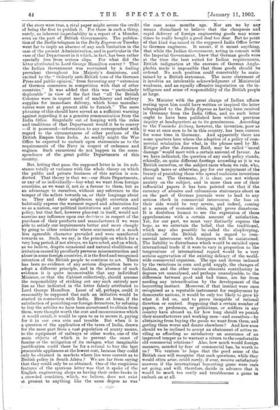A POOR INVENTION.
WE accept, of course, with a whole heart the assur ance of the Daily Express that the spurious letter from the India Office to certain German millowners which it published in a Berlin telegram on Tuesday reached it "from a source which has always hitherto been found absolutely trustworthy." Yet, even so, our enterprising contemporary would have done well to pause for verifica- tion, even though pausing involved the dire possibility that, if the story were true, a rival paper might secure the credit of being the first to publish it. For there is such a thing, surely, as inherent improbability in a report of a blunder, even on the part of British Governments. The publica- tion of the Berlin telegram in the Daily Express on Tuesday went far to imply an absence of any such limitation in the case of the present Administration, and in particular in the case of that Department in it which, in fact, has been rather specially free from serious slips. For what did the letter attributed to Lord George Hamilton convey ? • That the Indian Government was restrained by a feeling prevalent throughout his Majesty's dominions, and excited by the " violently anti-British tone of the German Press and public opinion," from favouring any " extension of -German commerce in competition with that of other countries." It was added that this was " particularly deplorable " in view of the fact that " all the British Colonies were in urgent need of machinery and railway supplies for immediate delivery, which home manufac- turers were not at present able to furnish." The mere phrasing of this should have served as a sufficient warning against regarding it as a genuine communication from the India Office. Singularly out of keeping with the rules and traditions of that Department would it be to convey —if it possessed—information to any correspondent with regard to the circumstances of other portions of the British Empire than India. As readily might the War Office be expected to embark upon statements as to the requirements of the Navy in respect of ordnance and engines. Such excursions do not happen in the corre- spondence of the great public Departments of this country.
But, letting that pass, the supposed letter is in its sub- stance totally at variance with the whole theory on which the ' public and private business of this nation is con- cluded. That theory is that we—our State Departments, or any of us individually—buy what we want from foreign countries, as we want it, not as a favour to them, but as an advantage to ourselves, without any reference to the temper of the sellers towards us, or their language about us. They and their neighbours might entertain and habitually express the warmest regard and admiration for us as a..nation, our political institutions and our external policy, but that fact, however pleasant in itself, would not exercise any influence upon our deci!iols in respect of the purchase of • their products and manufactures if we were able to satisfy our requirements better and more cheaply by going to other countries where sentiments of a much less agreeable character prevailed and were manifested towards us. Such, we say, is the principle on which for a very long period, if not always, we have acted, and on which, as we believe, despite occasional and natural ebullitions of irritation caused by peculiarly perverse misconstruction and anise in some foreign countries, it is the fixed and recognised intention of the British people to continue to act. There has been no evidence of any serious disposition here to adopt a different principle, and in the absence of such evidence it is quite inconceivable that any individual Minister, or that the Cabinet collectively, should assume the responsibility of striking out any such entirely new line as that indicated in the letter falsely attributed to Lord George Hamilton. Least of all, perhaps, could it reasonably be supposed that such an initiative would be started in connection with India. Here at home, if the satisfaction of punishing our foreign detractors, by refusing to buy the articles we have been accustomed to obtain from them, were thought worth the cost and inconvenience which it would entail, it would be open to us to secure it, paying for it in our own coin and trouble. But when it is question of the application of the taxes of India, drawn for the most part from-a vast population of scanty means, to the equipment of railways -or other works, one of the main objects of which is to prevent the onset of famine or the mitigation of its ravages, what imaginable justification could there be for a refuSal to buy the bst procurable appliances at the lowest cost, because they could only be obtained in markets where lies were current as to British policy in South Africa ? We are far from saving that they could only be so obtained. One of -the suspicious features of the spurious letter was that it spoke of the English engineering shops as having their order-books in 1. crowded condition, .which, we believe, does not exist 4 present.. to anything like the same degree as was the case some months ago. Nor are we by any means disinclined to believe that the cheapness and rapid delivery of foreign engineering goods may some- times be really bought a good deal too dear. But no point of that kind was raised in the supposed India. Office letter to German engineers. It meant, if it meant anything, that while the Indian Government, acting in concert with the Imperial Government, knew that German goods were at the time the best suited for Indian requirements, British indignation at the excesses of German Anglo- phobia made it impossible that those goods should be ordered. No such position could conceivably be main- tained by a British statesman. The mere statement of it involves an intolerable acknowledgment of Ministerial weakness, and an equally offensive imputation on the in- telligence and sense of responsibility of the British people at large.
No Minister with the great charge of Indian affairs resting upon him could have written or inspired the letter telegraphed to the Daily Express as having been received in Germany from the India Office, and no such letter ought to have been published here without previous inquiry at headquarters as to its genuineness. According to the Vossische Zeitung, however, the invention, poor as it was at once seen to be in this country, has been current for some time iii Germany. And apparently there are some quarters here where the adoption of a policy of com- mercial retaliation for what, in the phrase used by Mr. Kruger after the Jameson Raid, may be called " moral damage" would meet with a certain amount of favOur. As we have indicated, the question of any such policy stands, ethically, on quite different footings according as it is we British ourselves, or the subject races whom we rule, who, through taxes or otherwise, pay for our enjoyment of the luxury of punishing those who spread malicious inventions about us.. The Germans, it is clear, are not without anxiety on the subject, and. in more than one of their influential papers it has been pointed out that if the currency of abusive and calumnious statements about us on the part of German journals were • to read to any serious check in commercial intercourse. the loss on their side would be very severe, and indeed, coming at a season of economic crisis, might prove disastrous. It is doubtless human to see the expression of these apprehensions with a certain amount of satisfaction. Yet, for our part, we must very distinctly express the hope, as we entertain the belief, that the traditional, which may also possibly be called the shopkeeping, attitude of the British mind in regard to com- mercial intercourse with foreigners will be maintained. The liability to disturbance which would be entailed upon international trade if it were to vary in proportion to the temperature of international regard would be a very serious aggravation of the existing delicacy of the world- wide commercial organism. The ups and downs induced by the variations in corn and gold supply, the changes of fashion, and the other various elements contributory in degrees yet unanalysed, and perhaps unanalysable, to the difference between good and bad times, are far from needing any intensification by the development of the boycotting instinct. Moreover, if that instinct were once recognised as a reputable instrument for employment by democratic nations, it would be only too likely to grow by what it fed. on, and to prove incapable of rational direction or • control. Supposing that a certain number of papers, or professors, or politicians, or soldiers in any country have abused us, for how long shOuld we punish their manufacturers and working men—and ourselves—by ab'staining from buying the goods we'want from- them; and getting them worse and dearer elsewhere ? And how soon should we be inclined to accept an abatement of active re- viling as affording so- satisfactory an assurance of an improved temper as to warrant a return to the comfortable old commercial relations ? Also, how much would foreign manners, mended by fear of commercial loss, be worth to us ? IVO venture to hope that the good sense of the British race will recognise that such questions, while they would often arise, could rarely; if ever, receive satisfactory answers if the international boycotting game were 'ones set going, and will, therefore, decide in advance that it would be much too costly and troublesome a game to embark on at all.







































 Previous page
Previous page